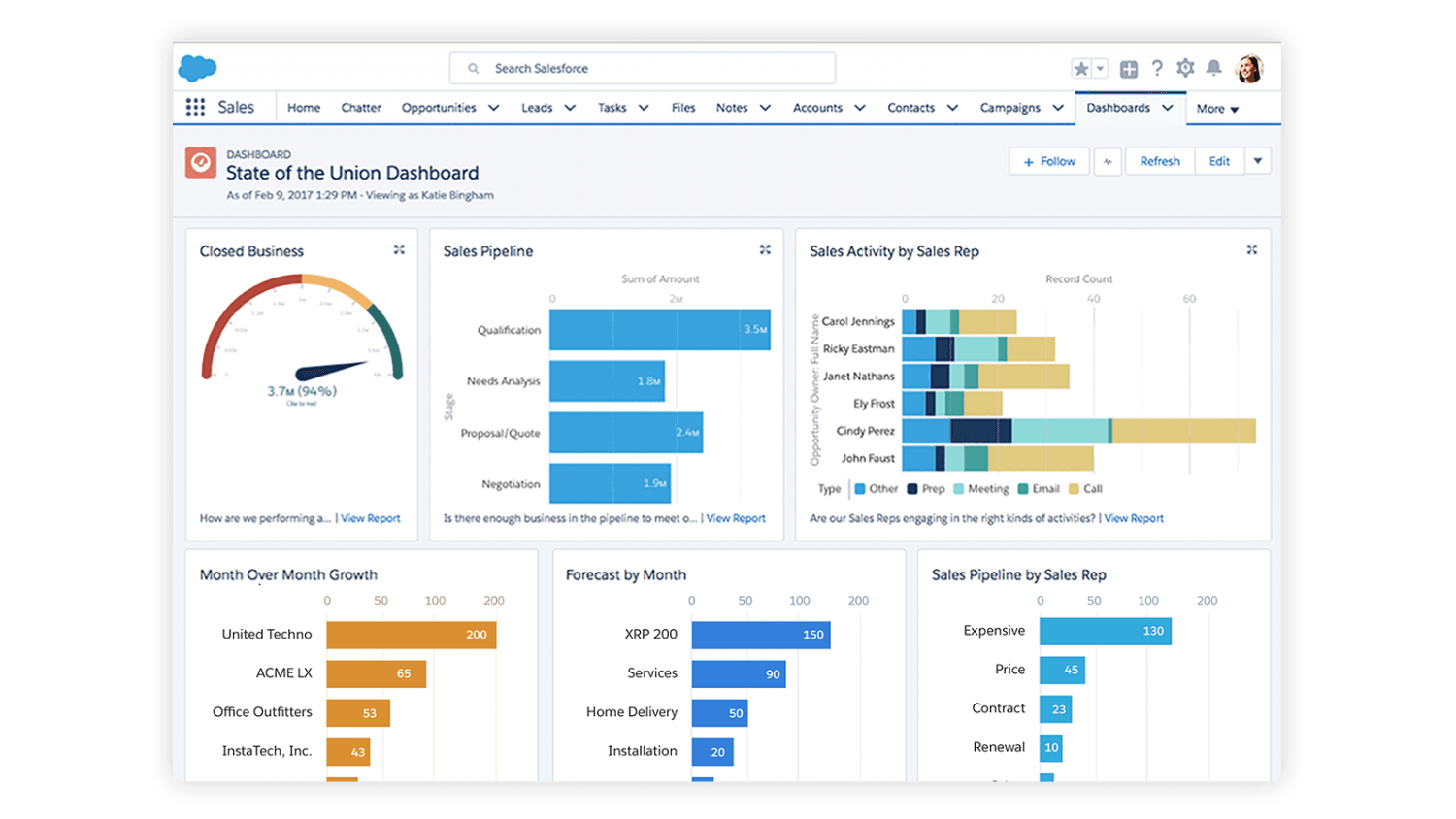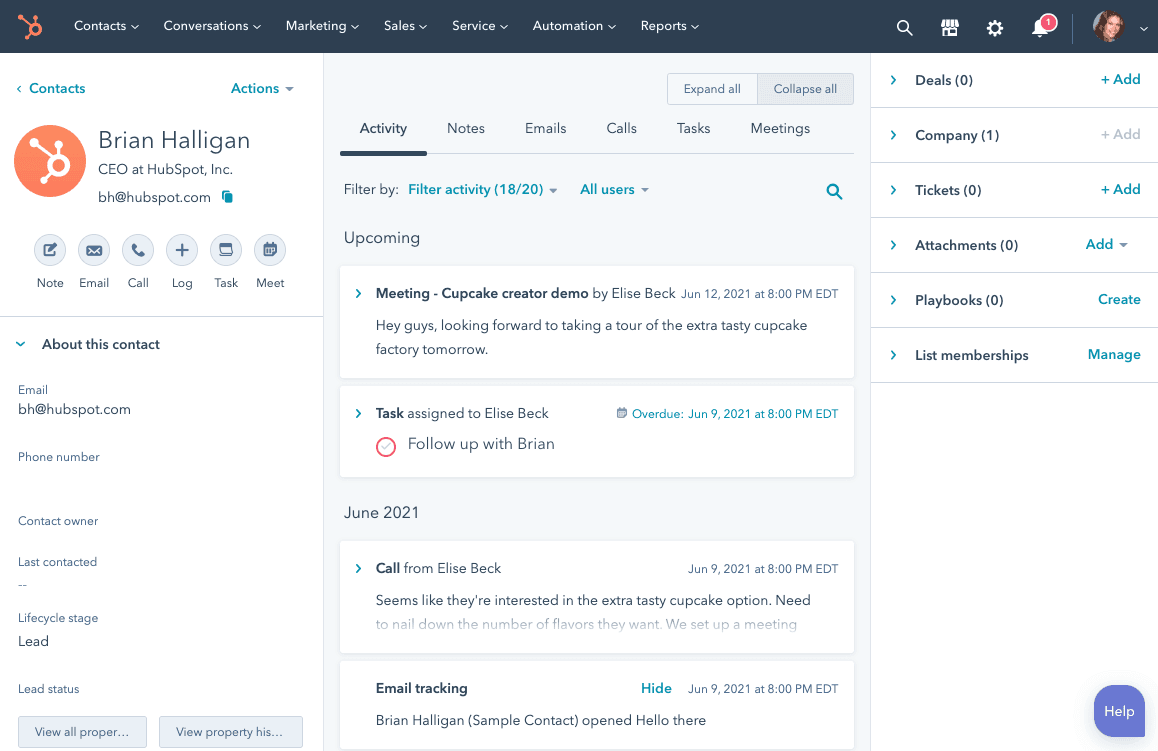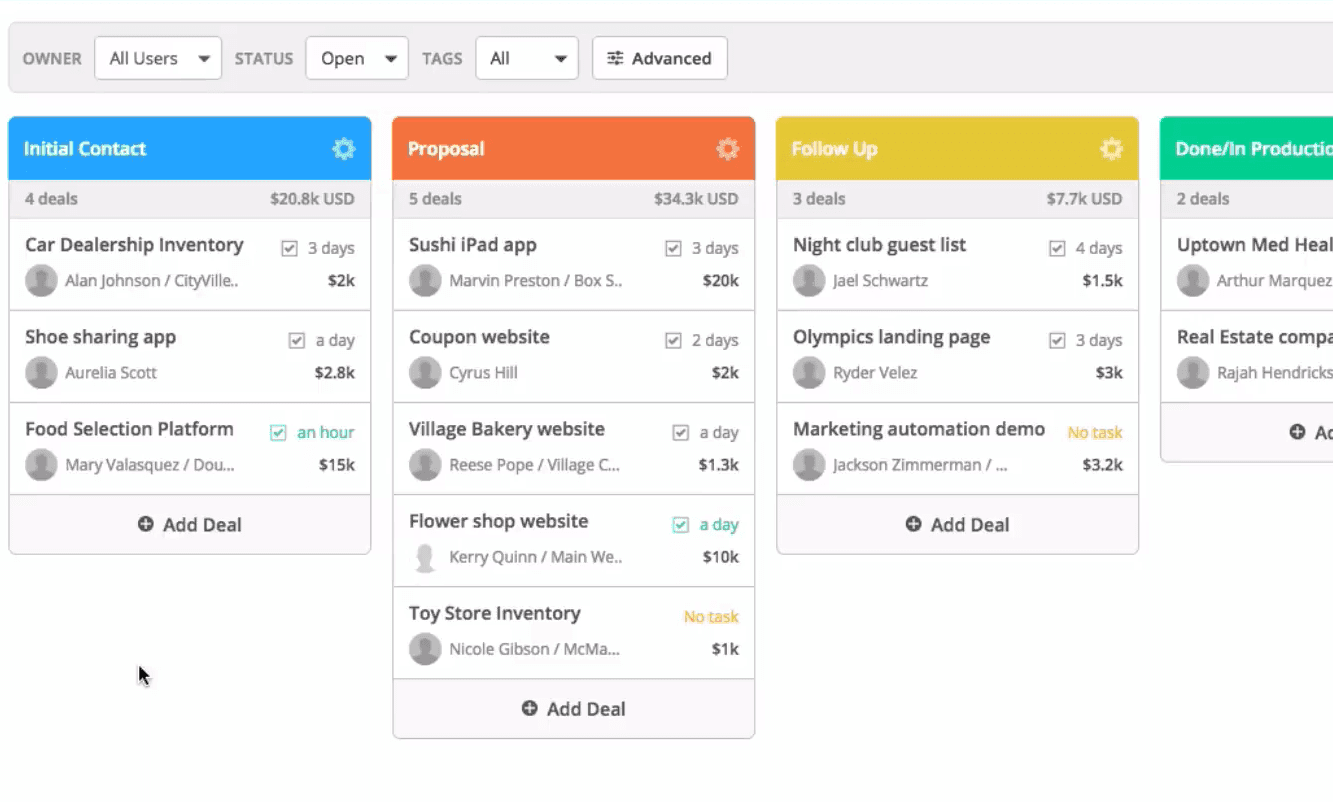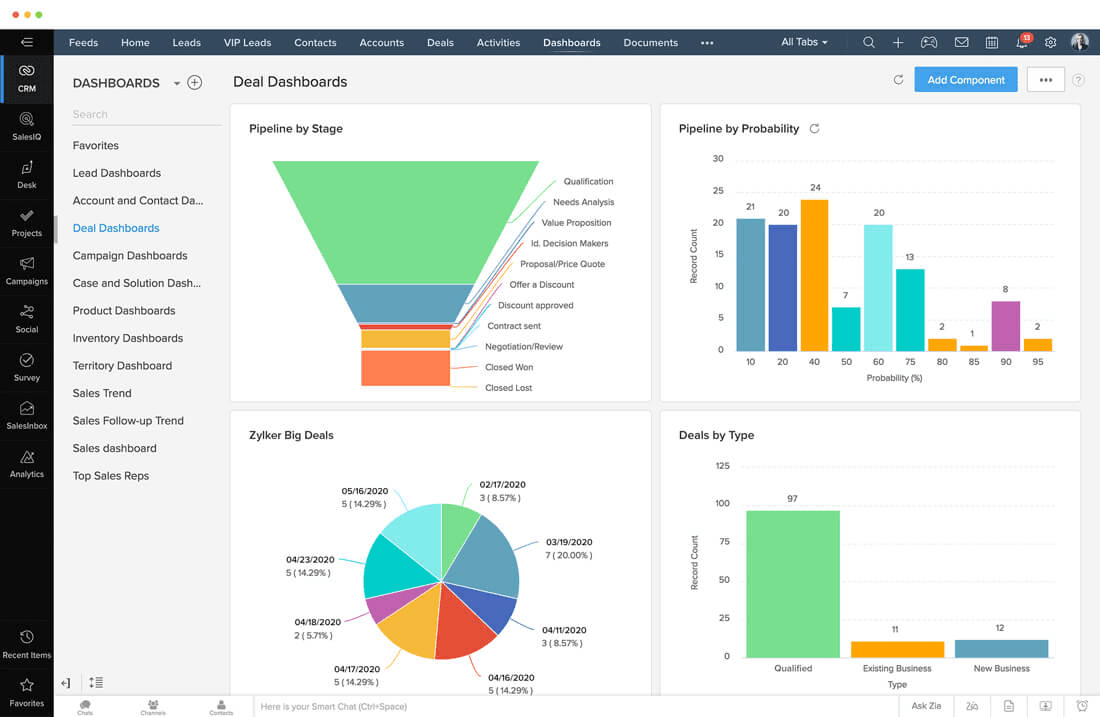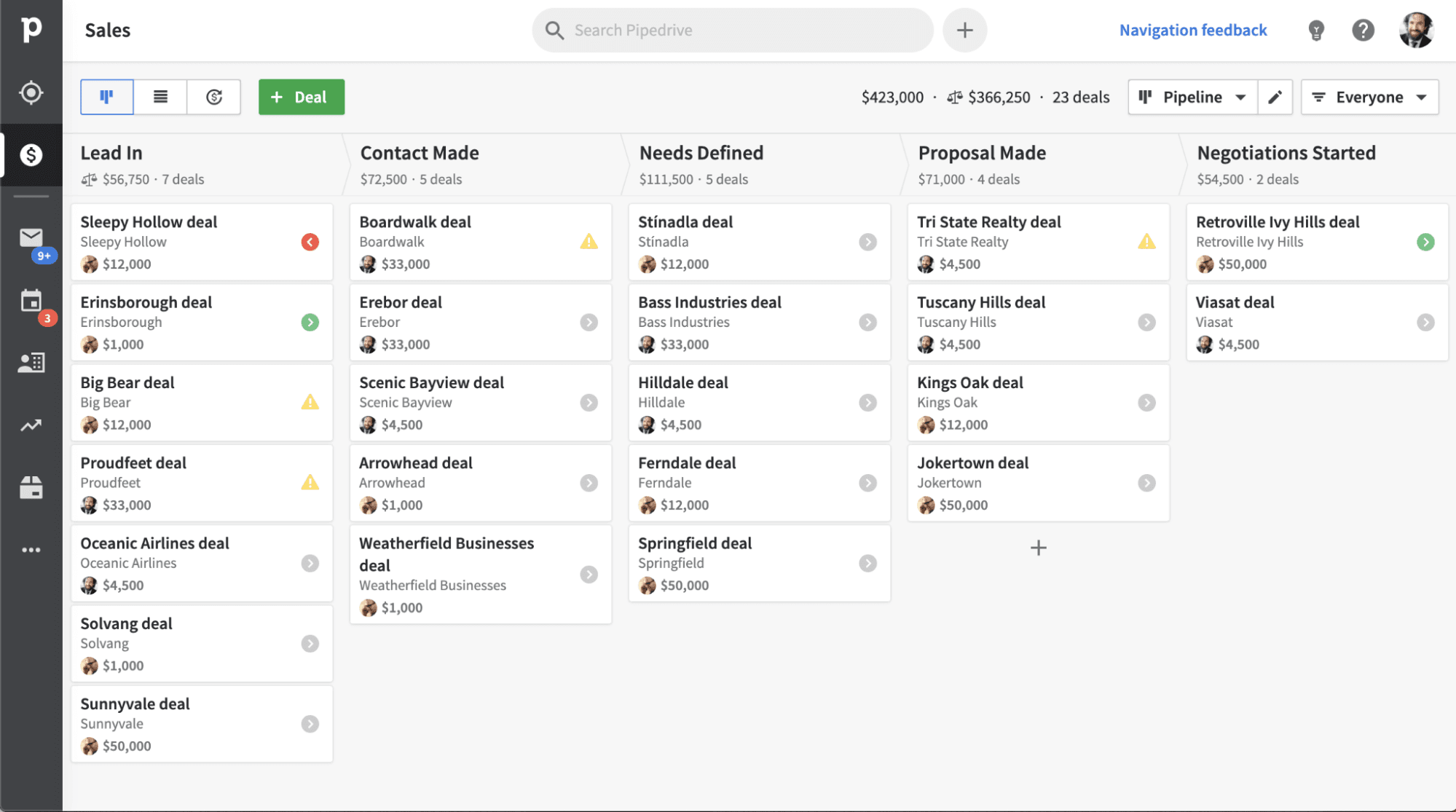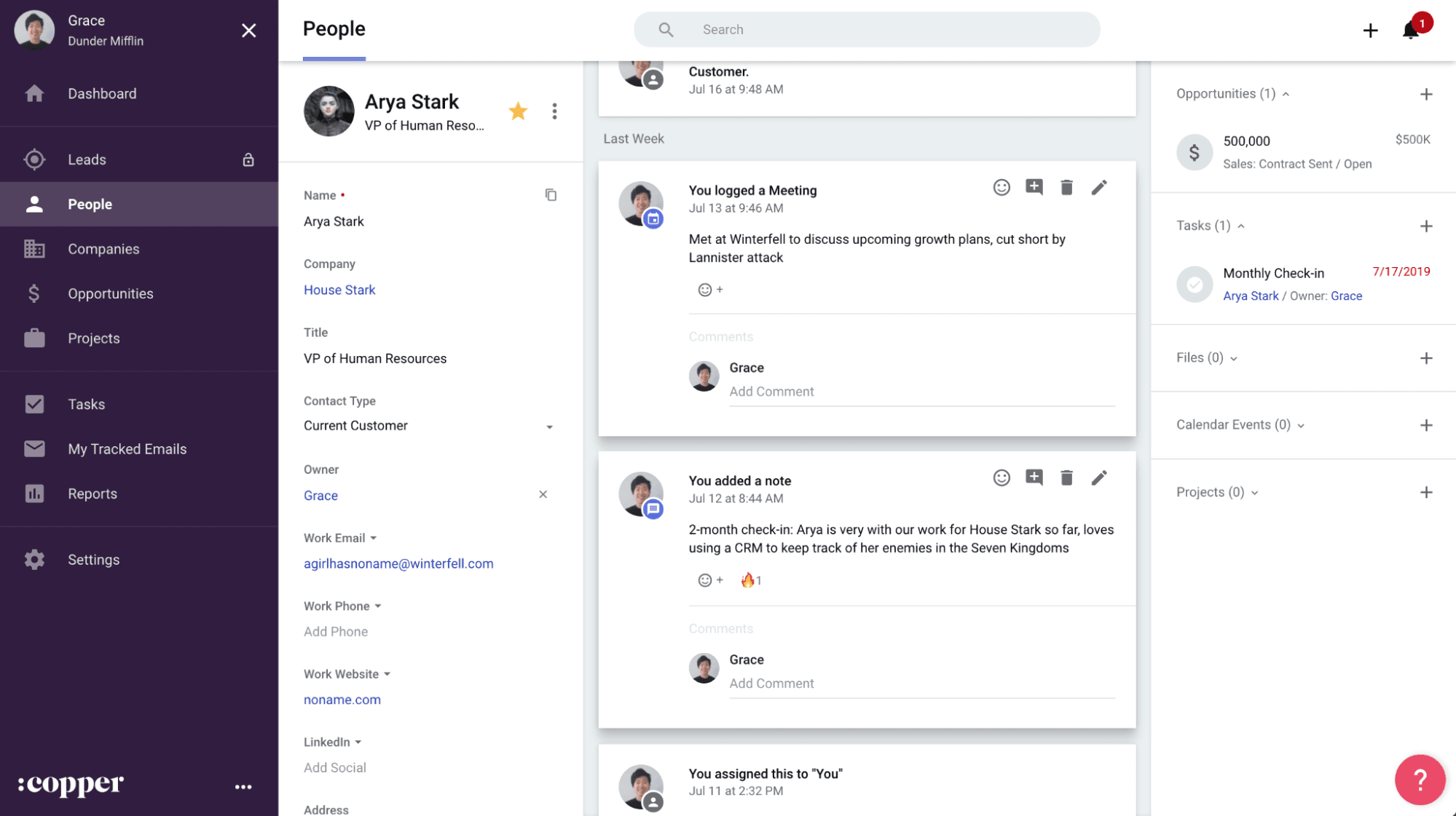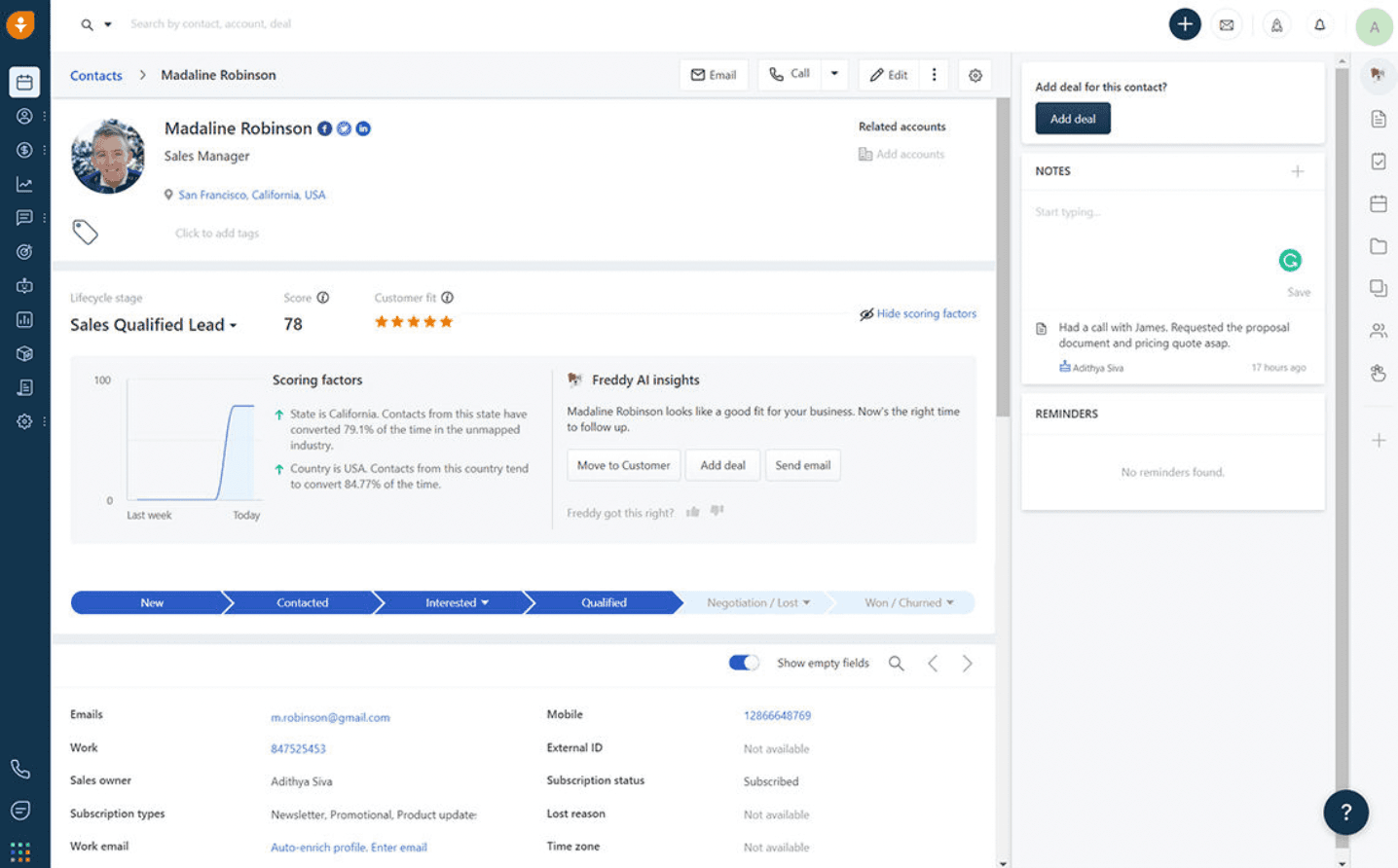Nov 5, 2021 | 10 minutes
The 7 Best CRMs for Automation and Integrations: A Comparison
We’ve delved into 7 of the best CRM platforms when it comes to automation. Read on to learn about their native integration offerings, API documents, available integration consultants, Integromat modules, and approach to integration.

Your CRM is the pulse of your business. Deals, lifecycle stages, lead status, website activity, contact information, personal information - your most crucial information lives in it.
That’s why all of your apps should have access to your CRM. To automate the busy work that bogs you down, spend more time on your most impactful work, and operate at maximum efficiency, all of your apps should be able to work with your CRM’s data to automate almost any business process imaginable.
We’ve delved into seven of the best CRM platforms when it comes to automation. Read on to learn about their native integration offerings, API documents, available integration consultants, Make modules, and their approach to integration.
Which CRM is the Best When it Comes to Automation? 7 Platforms to Consider
1. Salesforce
Image Source: Salesforce
As the leading CRM platform in the market, Salesforce is also the top platform for automation. It has native integrations with over four times as many apps as any other CRM platform (4,053 to be exact). It also has two different API architectural styles -- REST and SOAP -- which allow for a lot of flexibility when integrating external third-party apps that aren’t in its app marketplace yet.
If you need help using their APIs, their API documents are comprehensive, detailed, and easy to navigate.
If you want a consultant to integrate your external apps into Salesforce, you’re also in good hands. There are hundreds of Salesforce integration consultants on Upwork and Fiverr, with the top-flight ones commanding an hourly rate of up to $200.
If you use Make to build automations with your business apps, the iPaaS solution has ten modules that you can leverage to automate tasks with Salesforce. One of these tasks is emailing a new lead once you add them to Salesforce.
According to ChiliPiper, a scheduling and routing software for sales teams, the odds of connecting with and qualifying a lead plummets by 80% just five minutes after they press the submit button on a form. This automation will allow you to immediately reach out to your leads and get the ball rolling with them before it’s too late.
In regards to their approach to integrations, Salesforce is quite active. They worked hard to get a head start on the rest of the CRM market, so they’ve been able to slow things down since, but they’ve still kept their eye on the ball. You can keep counting on them to satisfy your integration needs.
All in all, Salesforce is the top CRM for automation, especially for enterprise companies. Its platform can get complicated and might not be the most user-friendly, but it still has plenty of native integrations to choose from and can integrate with virtually any app you want through their APIs or with an iPaaS solution like Make.
2. HubSpot
Image Source: HubSpot
Bursting onto the CRM scene in 2014, HubSpot decided to build upon its free CRM in 2017 by adding integrations to its software. Since then, they’ve aggressively built their app marketplace from the ground up, developing native integrations with 900+ apps that users can create workflows with right in their software.
HubSpot’s APIs lack flexibility - they’re only built around the architecture style REST - but they support external third-party integrations. HubSpot also gives you a lot of guidance with these APIs, as they have comprehensive, detailed, and easy-to-navigate API documents.
HubSpot is consistently rated right behind Salesforce as the second-best CRM on the market, so if you’d rather hire a consultant to integrate your external third-party apps with HubSpot, you’ve got a ton of options. There are hundreds of HubSpot integration consultants on Upwork and Fiverr, with the top flight ones commanding up to $100 per hour.
If you use iPaaS solutions like Make to integrate your apps, HubSpot can connect to those, too. Make has 67 modules with the CRM platform, which can enable you to build a broad spectrum of automations for your business.
One of these automations is updating the contact details of a company when you add them to HubSpot CRM. Make will automatically take this information from LinkedIn and update it in HubSpot for you so you can stay up to date with your prospects and don’t have to spend any time manually searching for and entering this information into your CRM.
As the CRM platform that’s right on Salesforce’s heels, one of HubSpot’s top priorities is to expand its app ecosystem to the point where it can penetrate the iPaaS market. And to any business that’s integration-focused, that should be music to their ears.
3. ActiveCampaign
Image Source: ActiveCampaign
As a burgeoning up-and-comer in the CRM space, ActiveCampaign has developed a rather impressive application ecosystem. It has 870 native integrations and its APIs are structured around REST, HTTP, and JSON that can integrate with external third-party apps that aren’t in its app marketplace yet.
In order to use ActiveCampaign’s APIs to their full potential, consider combing through their API documents. They’re extremely comprehensive, detailed, and easy to navigate.
If you’d rather hire a consultant to integrate your external apps into ActiveCampaign, you have plenty of choices to pick from. There are hundreds of ActiveCampaign integration consultants on Fiverr and Upwork, with the top-flight ones commanding up to $125 per hour.
ActiveCampaign also connects to Make, which has 56 modules with the CRM platform, allowing you to build a wide variety of automations.
One of these automations is creating a contact in ActiveCampaign whenever someone schedules a meeting with your company in Calendly. This can slash all the time that manually entering a contact’s information into ActiveCampaign takes, letting you spend significantly more time on the work that matters most to you.
ActiveCampaign is right behind HubSpot when it comes to their integration ecosystem, so they’ve been laser-focused on expanding their application library to catch up to them. And since ActiveCampaign can also connect to virtually any app through native integrations, APIs, and iPaaS solutions like Make, integration-focused businesses will do well with the CRM platform in their tech stack.
4. Zoho CRM
Image Source: Zoho
Released in 2005, Zoho CRM is one of the more established players in the CRM market. They’ve built a solid integration ecosystem into its platform, with over 500 native integrations and APIs built around REST. The CRM platform can also connect to external third-party apps and iPaaS solutions like Make and provides comprehensive, detailed, and easy-to-navigate API documents.
If you use Make to integrate your business applications, the iPaaS solution has 11 modules that you can leverage to build automations with Zoho CRM.
One of these automations is creating a new lead in Zoho CRM every time a new LinkedIn Lead Generation Ad form is submitted. This will help you store all your leads into a single source of truth, avoid glossing over any hot, new leads, and increase lead response times.
If you’d rather hire a consultant to integrate external third-party apps and build automations, Upwork and Fiverr have you covered. There are hundreds of Zoho CRM integration consultants on both marketplaces, with the top-flight ones commanding $65 per hour.
Zoho CRM doesn’t have as many native integrations as Salesforce, HubSpot, or ActiveCampaign, but they still have enough for businesses that have a solid focus on automation to do the trick. Their APIs also support third-party apps, so it’s clear that they have a firm focus on automations and expanding their integration ecosystem.
5. Pipedrive
Image Source: Pipedrive
Founded in 2010, Pipedrive reached unicorn status in just ten years. And for good reason. The CRM platform has been touted as one of the easiest CRMs to use on the market.
In regards to automation, they aren’t quite as distinguished, but they still have 290 native integrations and APIs structured around RESTful that can connect to iPaaS solutions like Make (but not external third-party apps). Their API documents are also comprehensive, detailed, and easy-to-navigate.
If you use Make to integrate your business apps, Pipedrive is one of the best CRMs to have in your tech stack. Make has a whopping 69 modules that you can use to build automations with Pipedrive.
One of these automations is creating contracts in Google Docs from a template and emailing them to potential customers when deals meet certain criteria in Pipedrive. This will save you the hassle and time of drafting up a new contract from scratch or even one from a template.
If you’d rather let a consultant integrate Pipedrive with your other applications and build automations for your business, you won’t be in as much luck as you would with the previously mentioned CRM platforms. There are only a handful of Pipedrive integration consultants on Upwork and Fiverr, and the top-flight ones command up to $125 per hour.
Similar to Zoho CRM, Pipedrive is another CRM platform that has a firm focus on expanding its integration ecosystem and, in turn, is ideal for businesses that have a solid focus on automation. It has enough native integrations and access to iPaaS solutions to do the job.
6. Copper
Image Source: Copper
By raising over $100 million in venture capital funding in only eight years, Copper CRM has established itself as another burgeoning up-and-comer in the CRM space.
And with over 100 native integrations, an API structured around RESTful that can connect to iPaaS solutions like Make (but not external third-party apps), and comprehensive, detailed, and easy-to-navigate API documents, it’s safe to say that they have a firm focus on expanding their integration ecosystem and that their automation capabilities are just sophisticated enough for businesses that have a solid focus on integrations.
Similar to Pipedrive, Copper is another CRM that Make works well with. The iPaaS solution has 51 modules that you can leverage to build automations with Copper.
One of these automations is creating a new lead in the CRM platform whenever a new user is created in Intercom. With more and more website visitors using live chat software to get their questions answered, this automation will help you store these important leads into a single source of truth and address them as soon as they come into your CRM.
If you’d rather hire a consultant to integrate your apps with Copper and build automations for your business, there are only a handful of Copper integration consultants on Fiverr. The good news is that they only cost $50 per project.
7. Freshsales
Image Source: Freshsales
Freshsales, the CRM offering of Freshworks, a front-office software, is a platform best suited for businesses who want to build simple automations. They have 36 native integrations, an API structured around REST that can connect to iPaaS solutions like Make (but not external third-party apps), and comprehensive, detailed, and easy-to-navigate API documents.
If you use Make to integrate your business apps, Freshsales is another CRM that will work well for you. Make has 53 modules that you can use to build automations with Freshsales.
One of these automations is creating a new event in your Google Calendar whenever a new appointment is created in Freshsales. This will save you the time and effort it takes to book time on your calendar for every single meeting you schedule. It might not seem like a lot for each meeting, but they can definitely add up.
Unfortunately, Freshsales doesn’t have the strongest focus on expanding its integration ecosystem, so there’s only one Freshsales integration consultant on Upwork. His services cost $95 per hour.
The Top CRM for automation
All of the platforms that we featured in this post are top-flight CRMs. But when you vet them for the different aspects of automation that we covered above, some are better than others.
If you’re going for the raw ability to integrate native apps and external third-party apps (or the sheer size and quality of native integrations, API capabilities, and quality of API docs), Salesforce takes the cake. HubSpot and ActiveCampaign come in second and third, respectively.
If you value the availability, quality, and cost of consultants who can integrate apps with your CRM the most, Zoho CRM, HubSpot, Active Campaign, and Salesforce all have ample amounts of consultants at affordable prices.
And if you lean heavily on Make to build automations, Pipedrive, HubSpot, ActiveCampaign, Freshsales, and Copper are the way to go. Make has between 50-70 modules that you can use to build automations with each CRM.
Overall, when taking all of the aspects above into consideration, HubSpot and ActiveCampaign are the top CRMs for automation and integrations. Both platforms have almost 1,000 native integrations each, they can integrate with external third-party apps through their API, there are countless amounts of affordable, high-quality integration consultants available for each CRM, and users can leverage Make to build a wide variety of automations with them.
Ready to make the automation revolution happen?

Clifford Chi
Content marketing writer at Make. Passionate about storytelling and creativity in B2B marketing. In my free time, I love to surf, play guitar, and watch baseball.

